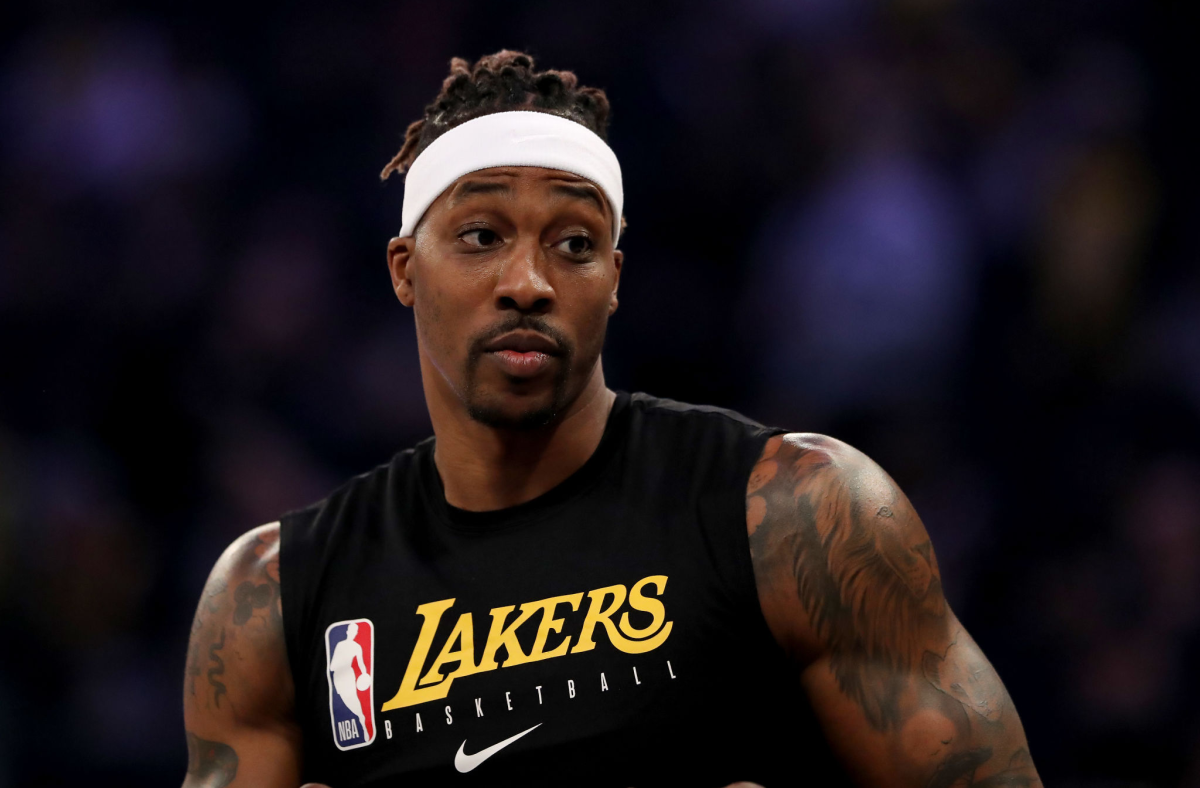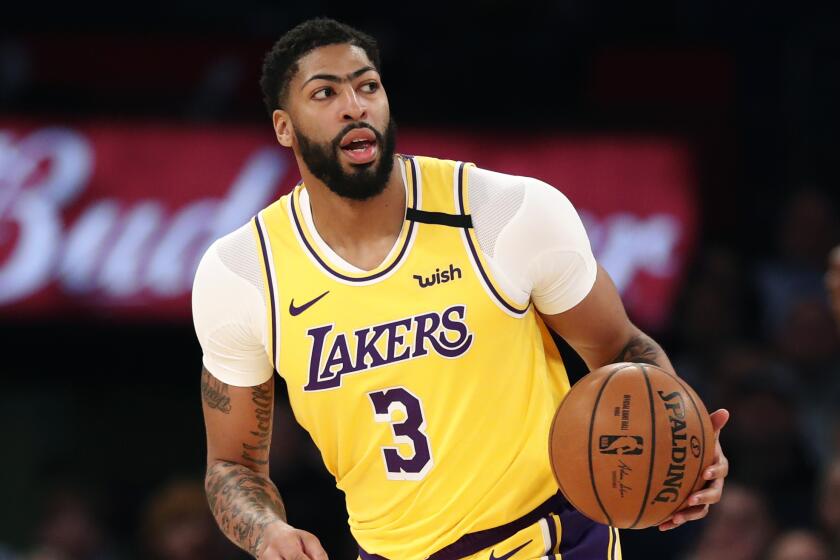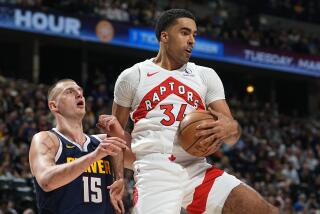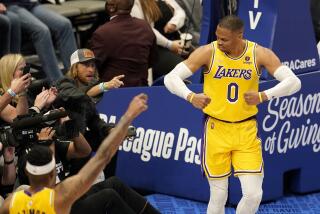Dwight Howard, Montrezl Harrell among those critical of NBA snitch hotline

- Share via
Dwight Howard was one of several NBA players who seriously considered not participating in the restart of the NBA season this month, out of concerns over social justice issues and spending time away from his children.
But once the Lakers’ center arrived last week on the Walt Disney World campus near Orlando, Fla., he appeared to be enjoying himself. Often smiling broadly, he gave thousands of Instagram followers a live look inside the NBA’s testing process, a game of Connect Four and a sparsely attended pool party.
Late Wednesday night, however, Howard was back on Instagram Live, this time with a furrowed brow.
Someone, he said, had reported him for not wearing a facemask on the property.
“I’m around nobody,” Howard said to the camera, looking taken aback. “Am I supposed to wear a mask?”
Evidently, someone else thought so. It was the first known instance of a player suggesting he’d been the target of an NBA-created hotline accessible to anyone living inside the NBA’s bubble through an app created by the league. Tips about possible violations of the league’s health and safety protocols can be left, anonymously, with either a call or text. The league’s security team then investigates.
Its official name is the “NBA Campus Hotline,” though it’s known as the “snitch hotline” inside the bubble. It has generated as much consternation and humor as it has discussion about the role that accountability will play in keeping players and staffers from 22 teams as safe as possible while cases of coronavirus increase at unprecedented levels in Florida, just outside Disney’s gates.
Mere questions about the hotline have led some players to quickly distance themselves from it.
Memphis rookie Ja Morant told reporters Thursday that he didn’t even know the phone number.
“I see nothing, I hear nothing,” he said. “I ain’t saying nothing.”
Said Clippers center Montrezl Harrell: “C’mon now, do I look like a player that has used that hotline?”
One week into his Disney stay, Clippers coach Doc Rivers joked he had already used the hotline to turn in Lakers star LeBron James and San Antonio Spurs coach Gregg Popovich.
“I’m trying to turn all these guys in. I think it’s phenomenal,” Rivers said. “We’re going to be the only team left when I’m done with this hotline thing.”
The reason for its creation, of course, is no laughing matter. Since the Orlando Magic became the first team to arrive on the resort’s campus July 7, Florida has reported 10,000 or more positive cases in a single day five times.
Whether the NBA can recoup hundreds of millions of dollars in revenue hinges on keeping its teams insulated from that spread and completing its season by early October. The league announced Monday it tested 322 players since teams arrived in Orlando, with two testing positive for COVID-19 while in quarantine. The MLS Is Back tournament, held on the same ESPN Wide World of Sports Complex where the NBA will play, has already provided an ominous warning that even best-laid plans can be upended; coronavirus outbreaks led two teams to withdraw before the tournament was two days old.
“This is not some normal thing,” Rivers said. “COVID, obviously, it’s not only that you can get sick but you can get other people sick, and so this is very important for all of us. We want to do our jobs. So I think having a hotline, I guess that’s what they’re calling it, I guess that’s important.”
Anthony Davis was among Lakers players who were torn about whether to keep his name on his jersey or use a social justice slogan. He chose to honor his family.
The hotline is just one piece in a larger system of accountability the NBA created to enforce the 113 pages of protocols that govern daily life. Teams are required to report to the league any potential or actual violations by players or staff. Players can also choose to report violations to their team or the players union.
Masks must be worn by anyone on campus except while they are inside their room, eating or drinking, during physical activity or while “engaged in an individual activity outdoors … that is not within six feet of another person from whom the player or staff member is required to maintain physical distance,” according to the league.
Some players have questioned how often the hotline will actually be used, seeing it as more of a deterrent. For players who split basketball-related income with the league nearly 50-50, there is strong incentive to abide by protocols and extend the season as long as possible.
“I think for the most part, guys are really trying to follow the rules,” Denver guard Troy Daniels said. “We’re not trying to stir up any controversy between us in the league. We just wanna come out here and play basketball and get paid.”
Then, of course, there are teams such as the Lakers, Clippers and Milwaukee Bucks who don’t want their championship aspirations derailed.
“I feel like the reason everybody will follow the rules is because everybody here wants to play,” Lakers guard Kentavious Caldwell-Pope said. “Let’s just follow the rules and get back to playing. That’s my mindset. I’m gonna follow all the rules that’s here. I just want to be back to playing basketball and do what we’re here for.”
Players understand the league is watching. Sacramento’s Richaun Holmes and Houston’s Bruno Caboclo were ordered to isolate for 10 more days after breaking quarantine — Holmes said he’d accidentally crossed the campus line to pick up a food delivery.
It was unclear whether those violations were reported through the tipline. But in the future, others might be.
“I don’t know if someone’s going to use it, but I think it’s sort of petty,” Utah center Rudy Gobert, the first NBA player to test positive for the novel coronavirus in March, told reporters. “At the same time, you want to make sure that people respect the rules. But I don’t think the line will really help at that point.”
Staff writer Tania Ganguli contributed to this report.
More to Read
All things Lakers, all the time.
Get all the Lakers news you need in Dan Woike's weekly newsletter.
You may occasionally receive promotional content from the Los Angeles Times.








